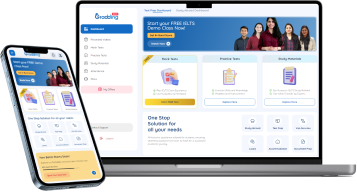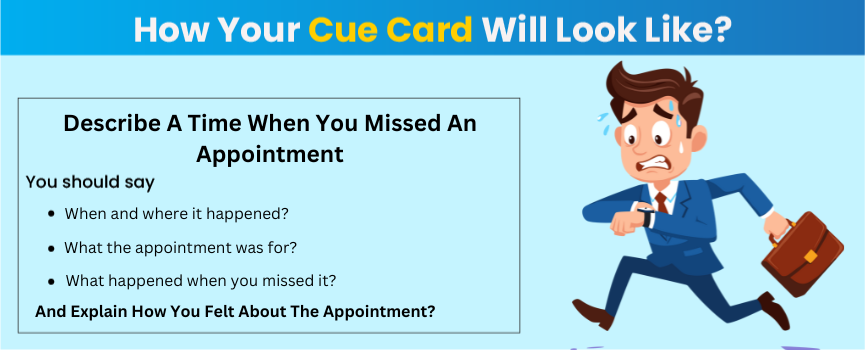Describe A Time When You Missed An Appointment - IELTS Cue Card
Last updated: Nov 14, 2025This blog is here to help you get ready for the IELTS speaking section, using the “describe a time when you missed an appointment” cue card. The goal is to help you talk better and give you a simple way to answer the question well. The speaking test has three parts: an introduction, the cue card, and some follow-up questions. Here are three sample answers to this topic, along with some possible follow-up questions.

Table of Contents
Introduction to IELTS Cue Cards
The IELTS cue cards are a big part of the speaking test. It features a prompt alongside specific guidelines or questions related to the topic. This part is important because it checks how well you speak, how easily you can talk, and how well you can explain your ideas. Thus, understanding how to navigate this task is crucial. In the following section, we will guide you on how to respond to this task effectively.

How to Answer the Cue Card?
In the IELTS speaking part 2, you'll get a cue card with a topic, like “describe a time when you missed an appointment”. You have to keep talking until the interviewer indicates it's time to conclude. This is followed by the discussion round, known as the follow-up question segment.
To excel in this section, there are four key elements you should consider including in your response. Please find the important points outlined below:
- When and where it happened?
- What was the appointment for?
- What happened when you missed it?
- And explain how you felt about the appointment.
Check out the image below to see what a cue card looks like during the IELTS speaking test part 2.

Describe A Time When You Missed An Appointment - Sample 1
In this section, we present the first sample for the cue cards. The structure and tone of this answer can serve as a useful reference as you prepare for the IELTS exam.
When and where it happened?
Around two years ago, I received a call from a major multinational company called Infosys for an interview appointment for the position of Sales Executive.
What was the appointment for?
It was a brilliant chance, but at the same time nervous about its interview. My family was ecstatic that I had been given this opportunity. I set my alarm for 8 a.m. that night because I had an interview in Connaught Place, Delhi, at 10 a.m., and it would take me at least two hours to get there by metro. Regretfully, my alarm clock didn't ring in the morning because I forgot it was broken.
What happened when you missed it?
It was ten in the morning when I eventually woke up, and I was heartbroken to discover that I had missed my appointment. My family was just as upset as I was, and I couldn't stop crying. I attempted to reach the HR department of the company to reschedule, but luck was not on my side. They informed me that it was a walk-in interview scheduled only for that specific day and that there were no other dates available; they could not hire me if I was not on time.
And explain how you felt about the appointment.
This experience served as a significant lesson for me about how crucial it is to be disciplined and punctual if one aims to secure a good job. Additionally, I was unable to console myself, and my family was heartbroken after this incident, but I am working on returning to a normal life.

 Access speaking Mock Test
Access speaking Mock Test Describe A Time When You Missed An Appointment - Sample 2
Here's a second sample of “describe a time when you missed an appointment”. Using how this is written and how it sounds will likely help you do better on the IELTS.
When and where it happened?
Well, in this contemporary era, I must say that time is a very crucial thing that cannot be brought back. Many things can be regained with time, like money and reputation, but time can never come back. So, here I would like to talk about a time when I unfortunately missed an important appointment. The incident was two years ago when my mother and I booked an appointment with our doctor for my brother’s health checkup.
What was the appointment for?
I remember that time clearly, my father had gone to an old business meeting and was out of India for urgent work. At that time, my mother and I were at home, and my brother suddenly fell very ill. He was quite sick, and since we live in a small town, there are not many hospitals or medical checkup centres. There are only two or three hospitals and medical checkup centres. There are only two or three hospitals, and one of the best is Dr Shant Jain’s clinic, so we decided to visit there.
What happened when you missed it?
After reaching, we took a slip, and we were number 36 in line, continuously waiting. But suddenly, at that time of our appointment, my brother vomited, and my mother and I had to step out of the hospital to clean him up. Unfortunately, we missed our appointment. When we returned and asked to reschedule, the staff were not accommodating.
And explain how you felt about the appointment.
I felt very sad because I was dissatisfied with their services. I believe that doctors should be polite and understanding to their patients, as they are often confused and stressed. They never come in a happy state. At that time, I was very dissatisfied with the hospital’s services, and I strongly recommended that the hospital improve its approach.


Describe A Time When You Missed An Appointment - Sample 3
This is the third sample for you to check out. The way this is set up and the style used can also help you get a good score on the IELTS speaking part.
When and where it happened?
Today I am going to tell you about the time I forgot the crucial arrangements for my friend’s 17th birthday party. As far as I remember, this party was celebrated at his house last year.
What was the appointment for?
At that time, I was occupied with my studying schedule and forgot to inform him of my absence. Later that night, after finishing my homework, I sent him a message to apologise for the unexpected inconvenience.
What happened when you missed it?
To be honest, I felt blue and regretful because I hurt him on his important occasion, and I promised that I would compensate for his disappointment by giving him a meaningful present to correct my mistake. Besides, I hope that he will forgive me and sympathise with me to strengthen our relationship and understand each other better.
And explain how you felt about the appointment.
I think I must be more disciplined and responsible to balance my tasks and life because it is essential for me to avoid more potential risks of undesirable experiences in the future.
Hopefully, these points point you in the right direction when you prepare for the IELTS speaking part 2. Next up, we will examine a table of lexical resources showcased in the samples, along with their meanings.
Master the IELTS exam with our Prep Boost
What’s included:
- Pre-recorded video lectures
- Advance Study Materials
- Detailed Feedback Report
Lexical Resources
In the samples, various advanced vocabulary words have been utilised, which are beneficial for enhancing your speaking skills. Learning this vocabulary for IELTS can make your answers sound better during the cue card task.
| Words | Meaning |
|---|---|
| Ecstatic | extremely happy |
| Regretfully | with regret: with sadness or disappointment |
| Eventually | in the end, finally |
| Reschedule | change the time of (a planned event). |
| Disciplined | to train somebody to obey and to behave in a controlled way |
| Contemporary | belonging to the same time as somebody/something else |
| Regained | to get something back that you had lost |
| Unfortunately | to express regret or sadness about an unfortunate situation, |
| Continuously | in a continuous manner: without interruption. |
| Accommodating | agreeing to do or provide what somebody wants |
| Dissatisfied | not satisfied or pleased |
| Occupied | being used by somebody |
| Unexpected Inconvenience | a situation that causes trouble, difficulty, or disruption that was not anticipated |
| Felt Blue | to feel sad, melancholic, or downhearted |
| Compensate | to remove or reduce the bad effect of something |
| Sympathise | to feel sorry for somebody; to show that you understand somebody’s problems |
| Essential | completely necessary; that you must have or do |
| Undesirable | unpleasant or not wanted; likely to cause problems |
So, Thus, we have provided a selection of these advanced words alongside their definitions, ensuring you feel confident and prepared during your exam. Moving further, in the next section, we will provide some potential follow-up questions that examiners might ask in the third part of the IELTS speaking test.

Follow-up Questions With Answers
The third part of the IELTS speaking section usually lasts 4-5 minutes. Below are some practice questions with example answers, about the topic “describe a time when you missed an appointment”. provide some 10 follow-up questions along with their answers according to this topic, and answer how a student will reply.
1. Is it important to be on time in your country?
Answer: Yeah, definitely. Being on time is really important here. It shows you respect other people. At school and work, you're expected to be punctual, and if you're always late, people might think you're not reliable. It's just something everyone tries to do.
2. How can people get better at being on time?
Answer: People could get better at being on time with tech. Like, setting a bunch of alarms and using phone calendars is smart. Also, just trying to get to places a bit early can help if something unexpected happens. Getting ready the night before, like packing a bag, can also save time in the morning.
3. Do you think tech helps people be more punctual?
Answer: For sure, tech has changed the game for punctuality. Gadgets have tons of things like scheduling apps, GPS traffic updates, and alarms. This makes it way easier to plan trips and sends reminders, so people can keep track of time and not be late by accident. Without these, lots of people would struggle more to handle everything.
4. What can businesses do to stop people from missing appointments?
Answer: Businesses could do a few things. Sending email or text reminders before appointments is a start. Setting up a system where people can confirm or change appointments online is also helpful. Also, if people can easily tell the business they're going to be late, that can help with schedules.
So, these follow-up questions and answers are designed to enrich your understanding of the cue card topic of “Describing an Instance of Missing an Appointment.”. The next section will offer valuable tips for excelling in the IELTS cue card task.
Tips to Excel in IELTS Cue Card
Want a great score on the IELTS speaking part 2? Here are some things to keep in mind:
- Read the card carefully, so you know what it's asking.
- Use that minute you get to plan what your answer.
- Watch the time (you have 1-2 minutes), and make sure you finish in time.
- Incorporate some idioms and cool phrases to make it sound interesting.
Conclusion
Summing up, when you are taking the IELTS speaking section, pay attention and know what you are saying. Scoring well is entirely achievable with the right preparation. If you encounter challenges in the speaking section, hopefully the samples can help you. They're about the speaking part 2 cue card topics. If you want more help, think about taking online IELTS Classes with experts.
0 comments

Practice Makes a Man Perfect!Take FREE ielts Mock Tests
Start FREE Mock TestPredict your IELTS Band

98% students got exact IELTS Band
What is your Target IELTS Band?
Get familiar with the Real IELTS Exam for Free!
Start Free Mock TestWe are available in :
BangaloreAhmedabadJaipurHyderabadKeralaPuneChandigarhMumbaiGurgaonChennaiKolkataTrivandrumNoidaKochiCalicutKottayamKollamThrissurIndoreUdaipurdisclaimer:logos and other registered trademarks of universities used on this platform are held by their respective owners. Gradding does not claim ownership or association on them, and their use is purely for informational and illustrative purposes.
















